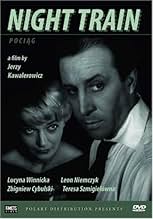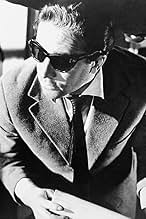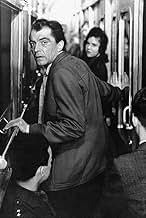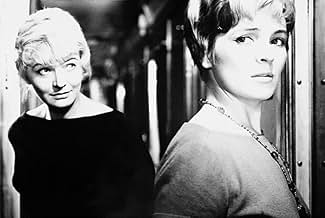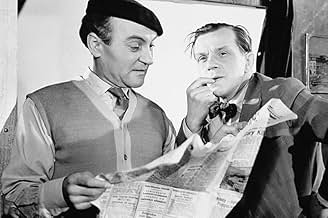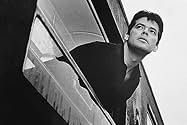AVALIAÇÃO DA IMDb
7,7/10
3,9 mil
SUA AVALIAÇÃO
Adicionar um enredo no seu idiomaJerzy enters a train set for the Baltic coast. He seems to be on the run from something, as does the strange woman with whom he must share a sleeping compartment.Jerzy enters a train set for the Baltic coast. He seems to be on the run from something, as does the strange woman with whom he must share a sleeping compartment.Jerzy enters a train set for the Baltic coast. He seems to be on the run from something, as does the strange woman with whom he must share a sleeping compartment.
- Direção
- Roteiristas
- Artistas
- Prêmios
- 2 vitórias e 1 indicação no total
Andrzej Herder
- Sailor
- (não creditado)
Barbara Horawianka
- Jerzy's Wife
- (não creditado)
- Direção
- Roteiristas
- Elenco e equipe completos
- Produção, bilheteria e muito mais no IMDbPro
Avaliações em destaque
A bird's-eye view of a crowded train station. A haunting, almost chilling jazz score with sensuous female vocals. Crisp black and white cinematography. You can't help but get the feel of a high quality noir film right from the first frame. The myriad human beings look like small creatures scurrying in all directions. It's a seemingly normal view at a train station. Soon, as the view draws closer, we get a glimpse of some of the primary players in this strangely ambiguous psychological drama.
A dapper looking man with sunglasses, Jerzy (Leon Niemczyk) enters the train compartment without a ticket (saying that he forgot everything at home) and insists on buying his way into the train, and also the neighbouring berths 'cause he wants to alone. He seems to be tensed, possibly just wants to go away some place, hardly smiles, and smokes a lot of cigarettes. A beautiful young blonde, Marta (Lucyna Winnicka) makes an appearance. She has a certain sadness in her eyes. She obviously has something to hide and is probably on the run from something. A younger man (Zbigniew Cybulski), hot on her pursuit, enters ticket-less and proceeds to constantly stalk her, every chance he gets. As luck would have it, some sort of technical error leads to Marta and Jerzy ending up in the same coupe of two berths. Both of them are visibly disconcerted by this, but eventually give in, and are forced to spend the night in the company of each other, owing to lack of any other option.
It's the holidays and the train is practically overflowing, as passengers crowd the corridors. They are a motley crew of individuals with varied behavioral traits and their own quirks. There are a group of ogling men who lustfully eye practically every woman that passes by. There's a flirtatious, married woman (Teresa Szmigielówna) trying to seek the attention of Jerzy every chance she gets, even at the momentary halts at the intermediate stations. For a while we can only hear her husband's voice, who seems to be a lawyer, and for some reason, seems to be a very boring companion! There's a young sailor who quietly stares in admiration at a pretty young thing, throughout the train journey. And then there's an man, an insomniac who cannot sleep in the bunk beds because they remind him of his concentration camp days, so he spends his time reading in the corridor.
Amidst all the chaos, there is some gossip about the latest news of a man who killed his wife and fled! A lot of conversations, exchanges of glances, vague ramblings later, the journey turns into an eventful one for all the passengers. The train suddenly stops at an unknown location, where official authorities board the train, for they have information that there is a wanted killer on board! Which of these ensemble of characters is the person they are looking for? There are suddenly grapevines, as doubt and tension fill the environment, and the characters we are by now familiar with, begin to exhibit a gradual transformation of sorts .
Jerzy Kawalerowicz's "Night Train" (Original title: Pociag) is not much about its plot. It is, in fact, a very realistic study of how a given group of people would behave and make judgments based on whatever little information they have. Passengers on a train are mostly strangers to each other. But a lot is judged (or misjudged) based on their overall demeanor, body language, personality, and what-not. It is a strikingly natural aspect of any human being and "Night Train" brings it out like no other! The lead characters are both strangers to each other, and in that one night together, they seem to assume quite a few things about each other. So do the other passengers. Where the director plays a winning hand, is at his tactful handling of the screenplay by keeping things deliberately ambiguous for the most part, playing a clever trick on the audience, by keeping them guessing constantly, as they start framing their initial mental perceptions about the various characters. The viewer, then, becomes a passenger himself, the kind of curious bystander who makes enquiries in hushed whispers, despite knowing that its none of his/her business. Or the kind that pushes the others aside to be amongst the first to know more and gossip about it; or the kind of person who starts judging based on initial impressions.
So what is the reality of all these characters then? We are given a hint of it much later, although not everything is declared explicitly. Kawalerowicz's ploy lies in keeping almost everything under wraps until the final half hour when some subtle twists almost sharpen the blurs, but not entirely! It is also during this time that we learn how a society as a whole, goes up in arms, against anything deemed wrong in the conventional sense. Somewhere amidst all the chaos, we, as individuals of society are also shown the mirror. It is alarming how people can turn their backs on you and stop at nothing to malign or blacklist you, just as quickly as they can turn you into a hero! Kawalerowicz's film has some extraordinary camera-work (apparently most of the train corridor scenes were shot on a set; it is almost impossible to make out), which has its highly realistic effect on the viewer (the suffocating feeling of trying to squeeze through a narrow, crowded passageway). It also has some great performances, especially by the two leads, Leon Niemczyk and Lucyna Winnicka, and there's some riveting drama and mesmerizing score to go along. But "Night Train" goes way beyond its very enticing exterior of a claustrophobic, tense noir, a supposed nod to Hitchcock's thrillers. It makes a very important statement on societal dynamics.
A hidden gem, a winner all the way!
A dapper looking man with sunglasses, Jerzy (Leon Niemczyk) enters the train compartment without a ticket (saying that he forgot everything at home) and insists on buying his way into the train, and also the neighbouring berths 'cause he wants to alone. He seems to be tensed, possibly just wants to go away some place, hardly smiles, and smokes a lot of cigarettes. A beautiful young blonde, Marta (Lucyna Winnicka) makes an appearance. She has a certain sadness in her eyes. She obviously has something to hide and is probably on the run from something. A younger man (Zbigniew Cybulski), hot on her pursuit, enters ticket-less and proceeds to constantly stalk her, every chance he gets. As luck would have it, some sort of technical error leads to Marta and Jerzy ending up in the same coupe of two berths. Both of them are visibly disconcerted by this, but eventually give in, and are forced to spend the night in the company of each other, owing to lack of any other option.
It's the holidays and the train is practically overflowing, as passengers crowd the corridors. They are a motley crew of individuals with varied behavioral traits and their own quirks. There are a group of ogling men who lustfully eye practically every woman that passes by. There's a flirtatious, married woman (Teresa Szmigielówna) trying to seek the attention of Jerzy every chance she gets, even at the momentary halts at the intermediate stations. For a while we can only hear her husband's voice, who seems to be a lawyer, and for some reason, seems to be a very boring companion! There's a young sailor who quietly stares in admiration at a pretty young thing, throughout the train journey. And then there's an man, an insomniac who cannot sleep in the bunk beds because they remind him of his concentration camp days, so he spends his time reading in the corridor.
Amidst all the chaos, there is some gossip about the latest news of a man who killed his wife and fled! A lot of conversations, exchanges of glances, vague ramblings later, the journey turns into an eventful one for all the passengers. The train suddenly stops at an unknown location, where official authorities board the train, for they have information that there is a wanted killer on board! Which of these ensemble of characters is the person they are looking for? There are suddenly grapevines, as doubt and tension fill the environment, and the characters we are by now familiar with, begin to exhibit a gradual transformation of sorts .
Jerzy Kawalerowicz's "Night Train" (Original title: Pociag) is not much about its plot. It is, in fact, a very realistic study of how a given group of people would behave and make judgments based on whatever little information they have. Passengers on a train are mostly strangers to each other. But a lot is judged (or misjudged) based on their overall demeanor, body language, personality, and what-not. It is a strikingly natural aspect of any human being and "Night Train" brings it out like no other! The lead characters are both strangers to each other, and in that one night together, they seem to assume quite a few things about each other. So do the other passengers. Where the director plays a winning hand, is at his tactful handling of the screenplay by keeping things deliberately ambiguous for the most part, playing a clever trick on the audience, by keeping them guessing constantly, as they start framing their initial mental perceptions about the various characters. The viewer, then, becomes a passenger himself, the kind of curious bystander who makes enquiries in hushed whispers, despite knowing that its none of his/her business. Or the kind that pushes the others aside to be amongst the first to know more and gossip about it; or the kind of person who starts judging based on initial impressions.
So what is the reality of all these characters then? We are given a hint of it much later, although not everything is declared explicitly. Kawalerowicz's ploy lies in keeping almost everything under wraps until the final half hour when some subtle twists almost sharpen the blurs, but not entirely! It is also during this time that we learn how a society as a whole, goes up in arms, against anything deemed wrong in the conventional sense. Somewhere amidst all the chaos, we, as individuals of society are also shown the mirror. It is alarming how people can turn their backs on you and stop at nothing to malign or blacklist you, just as quickly as they can turn you into a hero! Kawalerowicz's film has some extraordinary camera-work (apparently most of the train corridor scenes were shot on a set; it is almost impossible to make out), which has its highly realistic effect on the viewer (the suffocating feeling of trying to squeeze through a narrow, crowded passageway). It also has some great performances, especially by the two leads, Leon Niemczyk and Lucyna Winnicka, and there's some riveting drama and mesmerizing score to go along. But "Night Train" goes way beyond its very enticing exterior of a claustrophobic, tense noir, a supposed nod to Hitchcock's thrillers. It makes a very important statement on societal dynamics.
A hidden gem, a winner all the way!
10gombro
The film beautifully depicts the reality of trains, possibly not only those running in Poland but also all over the world. The claustrophobic atmosphere of the train brings people together and lets the viewers plunge into the story and its rhythm. Beautiful black and white pictures and melancholic jazz theme bring to mind other films form the era. What makes the film even more attractive is the final turning point and sudden change in the behavior of the passengers. The only regretful fact is that such intimate,subtle films are not made anymore. Great pity.If it was made in English by lets say Orson Welles it would have been a cult movie for sure all over the world just as it is in Poland.
10adipocea
This is a film which is a privilege to watch, I don't understand why Criterion collection doesn't have this issued yet. If you didn't watch it make yourself one of the biggest favors and watch it right away. I won't describe the movie, I won't spoil your pleasure. This is not a great movie in the sense that other great movies from the same period are considered masterpieces by critics but when we come to watch them they impress us very little. This is a treat, a delight, a thrill, by any modern standards, you have just to find some good subtitles not the lousy ones available on the web and translated online word by word by translation websites. I myself have watched the movie with this kind of subtitles and still I managed to be impressed to tears by this gem. A big bravo to Jerzy Kawalerowicz!
You know from the first minute that this is a different kind of train thriller. The first shots are in the station, lots of people bustling about, but instead of "busy" music on the soundtrack, the music here is slow, and it is cool jazz. This sets up the detached tone from the beginning. Some of the characters are nervous, even hysterical, but the director keeps everything at arm's length.
The story is very simple: A man on the train is fleeing after killing his wife. It is not known whether he is alone or with a woman. The movie concentrates on two couples, a single woman, and a single man. The three women move between the men--are they ordinary women looking for companionship, or is one of them trying to help, or escape from, the killer?
The scene in which the murderer is caught will recall the same scene in M and, of course, since the movie is Polish, the hunting down of fleeing, terrified people which so recently happened on Polish soil. The photography, excellent throughout, is especially beautiful and powerful in this scene. The director makes us aware of the symbolism, but not in an obtrusive way. The man who picks up the Cross and what he does with it quietly makes the point that the murderer and his pursuers are not different in kind, only in degree.
The story is very simple: A man on the train is fleeing after killing his wife. It is not known whether he is alone or with a woman. The movie concentrates on two couples, a single woman, and a single man. The three women move between the men--are they ordinary women looking for companionship, or is one of them trying to help, or escape from, the killer?
The scene in which the murderer is caught will recall the same scene in M and, of course, since the movie is Polish, the hunting down of fleeing, terrified people which so recently happened on Polish soil. The photography, excellent throughout, is especially beautiful and powerful in this scene. The director makes us aware of the symbolism, but not in an obtrusive way. The man who picks up the Cross and what he does with it quietly makes the point that the murderer and his pursuers are not different in kind, only in degree.
Sadly, I can't agree with most people who find this film to be Hitchcockesque in its representation of a thriller.
To say this would be to say that your Jaguar is just like a Mercedes. They might both be fine cars, but they are in no way alike.
The really quite simplistic plot travels at a slow and in many ways, inexplicable pace. There is little tension built up, and, for the most part, little mystery to be found.
However, don't take any of this to be a retrograde description.
The various small character subplots and interactions are wonderful. The whole journey has a quite haunting feel to it, which I find I am at loss to explain, because if I analyse the film, there is no real reason to this feeling. And yet, there it is.
The beautiful and mysterious Lucyna Winnicka is utterly mesmerising.
In so many ways this film shouldn't work with anything like the power it achieves, but somehow it does. If it captures you in the way it has me, then it will stay with you long after the event, from the strange individual passengers right down to the oh so ethereal soundtrack.
I am without explanation, but I truly hope it gives you the feeling of something wonderful it gave me.
To say this would be to say that your Jaguar is just like a Mercedes. They might both be fine cars, but they are in no way alike.
The really quite simplistic plot travels at a slow and in many ways, inexplicable pace. There is little tension built up, and, for the most part, little mystery to be found.
However, don't take any of this to be a retrograde description.
The various small character subplots and interactions are wonderful. The whole journey has a quite haunting feel to it, which I find I am at loss to explain, because if I analyse the film, there is no real reason to this feeling. And yet, there it is.
The beautiful and mysterious Lucyna Winnicka is utterly mesmerising.
In so many ways this film shouldn't work with anything like the power it achieves, but somehow it does. If it captures you in the way it has me, then it will stay with you long after the event, from the strange individual passengers right down to the oh so ethereal soundtrack.
I am without explanation, but I truly hope it gives you the feeling of something wonderful it gave me.
Você sabia?
- CuriosidadesStaszek, the young man following Marta, is seen several times getting on the train after it has started moving. The inspector warns him a couple of times that it is dangerous. Zbigniew Cybulski who plays Staszek died a few years later, aged 39, after falling under a moving train he was attempting to board at Wroclaw Glowny railway station in Poland.
- ConexõesFeatured in Fejezetek a film történetéböl: A lengyel film (1990)
Principais escolhas
Faça login para avaliar e ver a lista de recomendações personalizadas
- How long is Night Train?Fornecido pela Alexa
Detalhes
- Tempo de duração
- 1 h 39 min(99 min)
- Cor
- Mixagem de som
- Proporção
- 1.37 : 1
Contribua para esta página
Sugerir uma alteração ou adicionar conteúdo ausente

